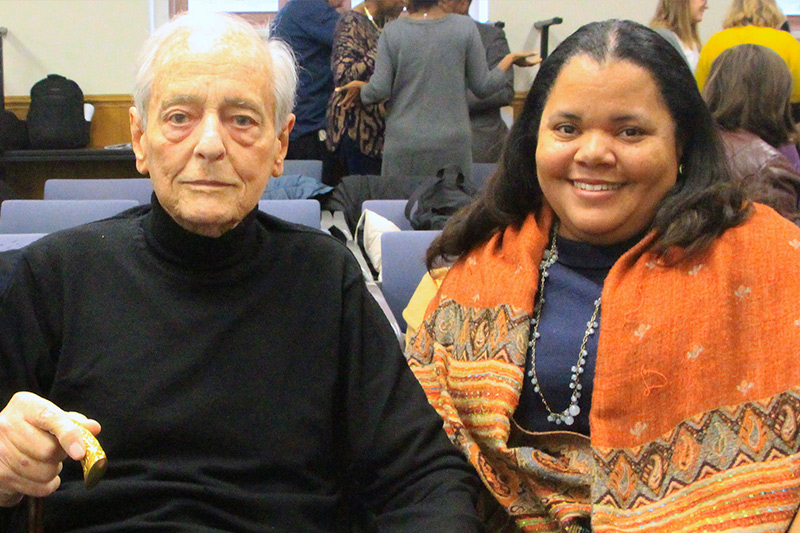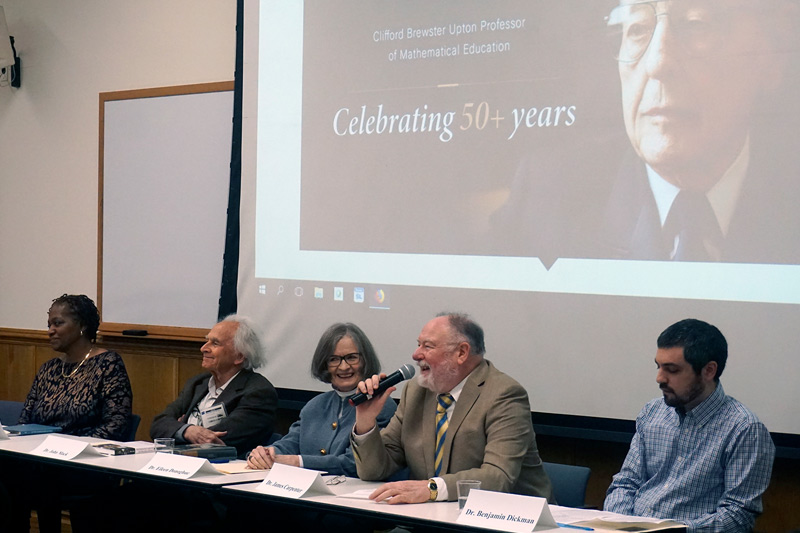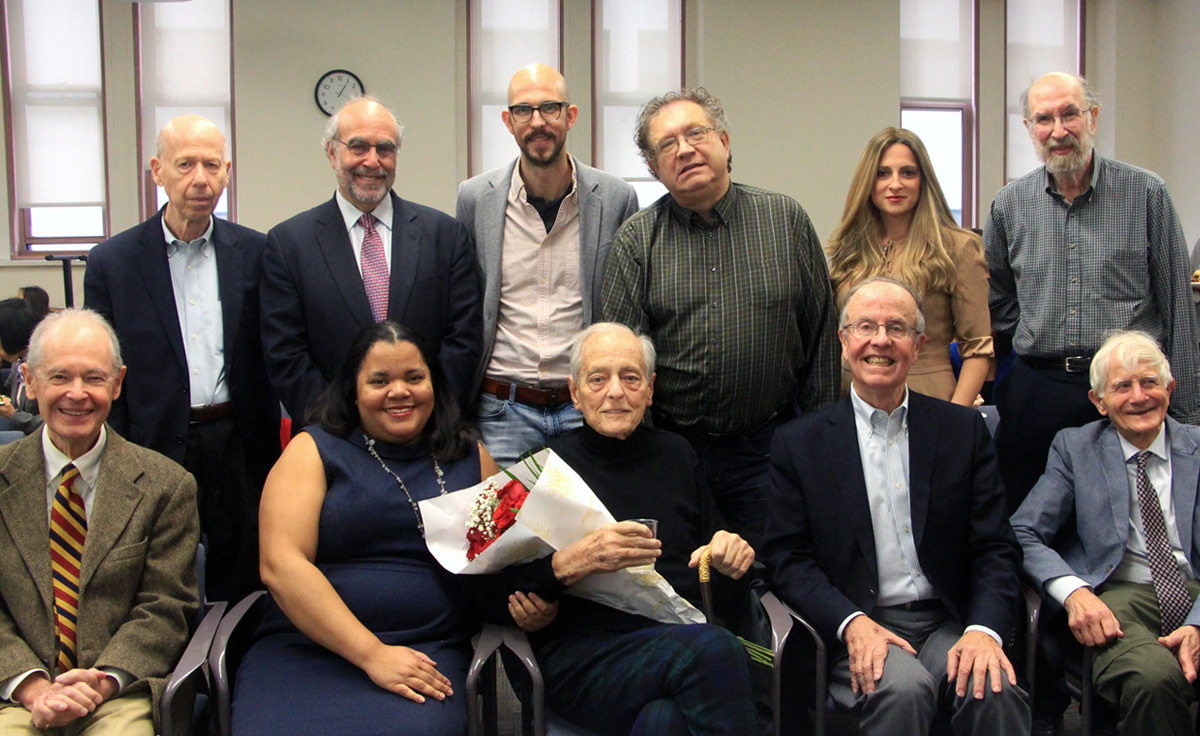If one were to represent Bruce Vogeli numerically, it would look, in briefest form, something like this:
55: The number of years that Vogeli, TC’s Clifford Brewster Upton Professor Emeritus of Mathematical Education, has served on the College faculty (or more than half the lifespan of what is now the Department of Mathematics, Science & Technology).
2,000: TC students whom Vogeli has taught (a conservative estimate).
200: Dissertations and theses he’s sponsored (ditto).
24: Books published (including seven that Vogeli, who celebrated his 90th birthday on November 25th, has pumped out during the past decade alone, and three in just the past five years).
But Vogeli, whose present and past colleagues and students gathered at TC in November to pay him tribute, has made an impact that transcends mere numbers. He is particularly known for his bestselling school mathematics textbook series, extensive documentation of how the teaching of mathematics varies in nations and cultures around the world, and for his generosity in publishing the contributions of former students in the series of volumes he has edited or co-edited on teaching practices in the former Soviet Union, Latin America, the Middle East and other regions.
[Click here to read testimonials about Bruce Vogeli and learn more about his remarkable career. Click here to contribute to the Bruce Vogeli Scholarship Fund.]
Indeed, his reach as a teacher and mentor is reflected not only in the sheer number of students he has worked with, but in the range of countries and cultures they represent. That fact was readily apparent among those offering testimonials at November’s event, which was organized by the Department of Mathematics, Science, & Technology and the Program in Mathematics Education.
“He has been present in everything I’ve done,” said Orlando Alonso (Ed.D ’09), Associate Professor of Mathematics Education at New York City’s Lehman College. “He changed my life.”
“He has been present in everything I’ve done. He changed my life.”
—Orlando Alonso (Ed.D ’09)
“He opens doors for you to believe in yourself,” said Hong Yuan (Ph.D ’18), Assistant Professor of Mathematics at the Borough of Manhattan Community College, adding that she considers her students to be the “pedagogical offspring” of her TC teacher, mentor and adviser.
“The first thing Dr. Vogeli asked me is ‘How can I help you?’” recalled Yuan who now poses the same question to each student passing through her classroom.

Bruce Vogeli and Erica Walker
Vogeli “brought the world to TC” while simultaneously transporting the TC mission “out into the world,” noted Eileen Donoghue (Ed.D ‘87), Professor of Urban Education at the CUNY Graduate Center, who served on a panel of alumni, alumna and peers that opened the discussion of Vogeli’s life and accomplishments.
Michael Kent (Ed.D. ’10) was the 21-year-old son of civilian Peace Corps advisers when Vogeli touched down in Zaire (now the Democratic Republic of the Congo).
The image of Vogeli imbuing local teachers with the math skills they then passed along to students in a rural village has remained with Kent for decades.

TALKING BRUCE From left: Panelists Marilyn Maye (Ed.D. '03), Associate Professor of Educational Leadership at New Jersey City University; John Mack, Professor Emeritus at the University of Sydney's School of Mathematics and Statistics; Eileen Donoghue (Ed.D ‘87), Professor of Urban Education at the CUNY Graduate Center; James Carpenter, Professor of Mathematics at Iona College; and Benjamin Dickman (Ph.D. ’14) , math teacher and teacher coach at New York's Hewitt School.
“To think that someone from New York City came to Zaire to help those students amazes me to this day,” Kent said.
Kent credited the experience for ultimately bringing him to New York and for the doctorate he earned from TC.
Panelist Marilyn Maye, Associate Professor of Educational Leadership at New Jersey City University, recalled that she was a working mother when she arrived at TC to pursue an Ed.D in the mathematics program.
“He created a community for me, not only socially but intellectually.”
—Marilyn Maye (Ed.D ‘03)
“He honored the challenges of my situation and allowed me to thrive,” Maye (Ed.D ‘03) said, describing Vogeli as a “meticulous” adviser who refused to allow a misplaced pronoun find its way into her dissertation. Maye added that Vogeli “made me feel that I belonged. He created a community for me, not only socially but intellectually.”
Midway through the symposium, the guest of honor, who had been delayed by traffic, made a dramatic entrance that brought the audience to its feet and some listeners to tears.
“The army tells us to be all that we can be,” Vogeli said. “I believed each of my students could be all that they wanted to be – and they have all exceeded that expectation.”
“The army tells us to be all that we can be. I believed each of my students could be all that they wanted to be – and they have all exceeded that expectation.”
—Bruce Vogeli
Attention was also paid to Vogeli’s reputation as a something of a clotheshorse and his prowess on the dance floor – though it was on the latter front that Vogeli may have reached his limits as an educator.
“He tried to teach me ballroom dancing,” said Alexander Karp, Professor of Mathematics and Education, who co-edited Vogeli’s two-volume opus on Soviet mathematics. “Even Bruce couldn’t succeed at that.”
[Photo at top of the page] Top row, from left: TC Mathematics Lecturer Stuart Weinberg; Daniel Goroff, Professor Emeritus at Claremont’s Harvey Mudd College; TC's Nicholas Wasserman, Assistant Professor of Mathematics Education; TC's Alexander Karp, Professor of Mathematics Education; TC Mathematics Lecturer Rochy Flint and Joseph Malkevitch, Professor Emeritus of Mathematics & Computing at York College-CUNY; Bottom row, from left, all from TC: Neil Grabois, Visiting Professor; Erica Walker, Professor of Mathematics Education and Chair, Department of Mathematics, Science & Technology; Vogeli; Adjunct Professor J. Philip Smith; and Adjunct Professor Henry Landau.
